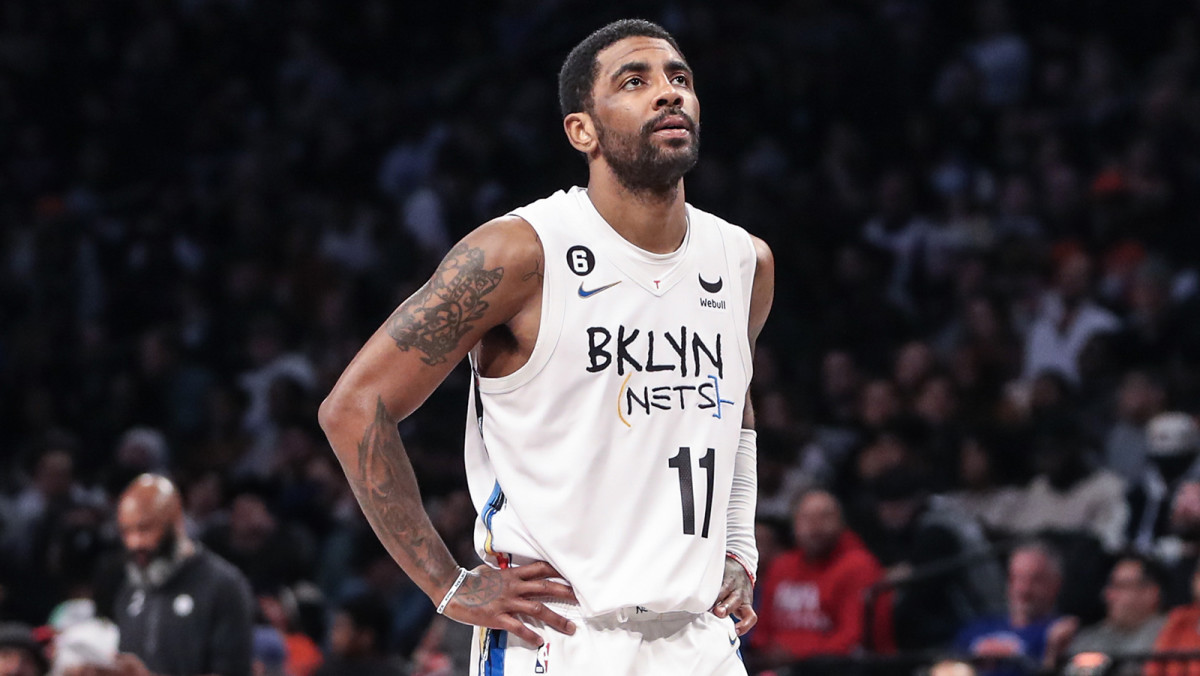With the Kyrie Irving Trade, the Nets Lose a Star But Gain Stability
Kyrie Irving was not in a Nets uniform Monday night or in the Nets’ arena or in their pregame hype video. He was not injured or suspended or banned or ineligible. He was not protesting or boycotting or defying team rules or government mandates. He was not skipping the game to ponder our political divisions.
Kyrie Irving was not in a Nets uniform Monday because Kyrie Irving, the NBA’s preeminent agent of chaos, is no longer a Net. Which means the Nets no longer have to concern themselves with all the things listed in that first paragraph, all of which happened over the course of Irving’s dizzying three-and-a-half-year reign of terror in Brooklyn.
For the first time since July 2019—when the team handed Irving a No. 11 jersey, as the price of acquiring Kevin Durant—Kyrie Irving is not the Nets’ problem. He’s headed to Dallas, to join MVP candidate Luka Dončić, to make another round of promises (loyalty, commitment, reliability) that he almost certainly cannot keep, if his past is any indication.
It took just 72 hours from the moment Irving demanded a trade to the final execution of a multiplayer deal with the Mavericks. The divorce became official Monday evening, just before the shorthanded Nets took the court against the Clippers (and lost 124–116).
Officially, the Nets acquired Spencer Dinwiddie, Dorian Finney-Smith and some draft picks—a respectable return for a talented-if-troublesome player on an expiring contract, whose market value had nearly bottomed out. But the Nets acquired so much more in this deal: Peace. Sanity. Stability. The luxury of arriving at the arena without having to wonder whether Irving will show up or worry about what he’s just tweeted or which group of political extremists might be protesting outside in his name.
The Nets lost a perennial All-Star, an electrifying scorer and ballhandler who can (and sometimes did) win games on his talent alone. But after all that Irving has put this franchise through—the absences, the controversies, the endless drama—you could almost feel the collective sigh of relief.
General manager Sean Marks did not address the media Monday, electing to wait until after Thursday’s trading deadline to discuss this deal (or any others that might come). Durant—who chose Brooklyn in tandem with Irving four years ago—also stayed mum, walking briskly past a small group of reporters after the game.

The Nets who did speak were unfailingly respectful of Irving and his decision to force a trade that probably killed their title hopes. And still, even in the cautious words they chose, a hint of truth came through.
“It’s been a whirlwind I’ve become all too familiar with,” Nic Claxton said generally of the trade and all the changes that come with it.
The Nets are indeed quite familiar with whirlwinds, having seen James Harden come and go, Steve Nash come and go, Ben Simmons come and … well, not “go” very often or very hard. (That’s another story entirely.) And they’ve seen Irving come and go repeatedly, never knowing how many games he might play or what random impulse might derail him.
All told, Irving played in just 143 of 278 regular-season games in his three-plus seasons with the Nets, and just 74 with Durant. If their arrival was rightly hailed as the greatest free-agent coup in franchise history, the payoff was profoundly underwhelming: three playoff appearances, two first-round exits, one second-round defeat.
The Durant-Irving era was an abject failure. There are perhaps a dozen reasons for that, including injuries in the 2021 playoffs. But it’s irrefutable that Irving himself tanked the Nets’ title hopes the last two seasons—first by refusing the COVID-19 vaccine (making him ineligible for home games), then by forcing this midseason trade.
Though rival executives praised the Nets’ haul—Finney-Smith is an elite defender, Dinwiddie an excellent scorer-playmaker—the reality is that Brooklyn is now a team with one superstar instead of two. And it’s a lot harder to make a deep playoff run with just one.
“I’m intrigued with what we can do,” coach Jacque Vaughn said. “The lineups are gonna be mix-and-match a little bit. … Ky and Kevin have the ability to save you at the end of the game, just their shotmaking, their sheer ability to put the ball in the basket. We’ll use a collective group to get it done.”
The reconfigured Nets should be stronger defensively, deeper overall and (needless to say) more stable without Irving planting landmines all over Brooklyn. They also might not be done reconfiguring.
Sources said the Nets worked vigorously Monday to expand the trade, in hopes of acquiring Fred VanVleet from the Raptors in a three-way deal (with Dinwiddie presumably landing in Toronto). When those efforts failed, the Nets and Mavericks executed their trade. But that doesn’t rule out another run at VanVleet, or any other veterans who could help Durant, before the trade deadline hits at 3 p.m. ET on Thursday.
There are still so many unknowns: Are Dinwiddie and Finney-Smith here to stay? Can the Nets acquire more help by the deadline? How far can this team go in the postseason? And will it be enough to satisfy Durant? Or will he renew his own trade request after the season?
Those are the questions rival executives are now asking. And that last one is really the only one that matters. Durant abandoned a championship team in San Francisco to join Brooklyn four summers ago, because he envisioned a partnership with Irving as his best path to glory.
Irving shattered the dream, undermined it at every turn, in every imaginable way (and several no one could have imagined). But the NBA’s reigning chaos agent is gone now, rendering the Nets a little less potent but infinitely more sane.
